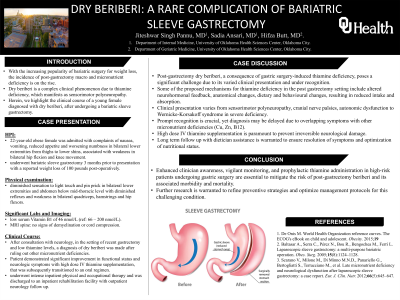Monday Poster Session
Category: Stomach
P3417 - Dry BeriBeri: A Rare Complication of Bariatric Sleeve Gastrectomy
Monday, October 28, 2024
10:30 AM - 4:00 PM ET
Location: Exhibit Hall E

Has Audio
.jpg)
Sadia Ansari, MD
University of Oklahoma Health Sciences Center
Oklahoma City, OK
Presenting Author(s)
Sadia Ansari, MD, Jiteshwar Pannu, MD, Hifza butt, MD
University of Oklahoma Health Sciences Center, Oklahoma City, OK
Introduction: With the increasing popularity of bariatric surgery for weight loss, the incidence of post-gastrectomy macro and micronutrient deficiency is on the rise. Dry beriberi is a complex clinical phenomenon due to thiamine deficiency, which manifests as sensorimotor polyneuropathy. Herein, we highlight the clinical course of a young female diagnosed with dry beriberi, after undergoing a bariatric sleeve gastrectomy.
Case Description/Methods: A 22-year-old obese female was admitted with complaints of nausea, vomiting, reduced appetite and worsening numbness and weakness in bilateral lower extremities. She underwent a bariatric sleeve gastrectomy 3 months prior to presentation, with a reported weight loss of 100 pounds post-operatively. Physical examination revealed diminished sensation in bilateral lower extremities and lower abdomen with diminished reflexes and weakness in bilateral quadriceps, hamstrings and hip flexors. Blood work was fairly unremarkable except a low serum Vitamin B1 of 46 nmol/L (ref: 66 – 200 nmol/L). MRI spine did not demonstrate signs of demyelination or cord compression. After consultation with neurology, in the setting of recent gastrectomy and low thiamine levels, a diagnosis of dry beriberi was made. Patient demonstrated significant important in functional and neurologic status with high dose IV thiamine supplementation, that was subsequently transitioned to an oral regimen. She also underwent intense inpatient physical therapy and was discharged to an inpatient rehabilitation facility with outpatient neurology follow up.
Discussion: Post-gastrectomy dry beriberi, a consequence of gastric surgery-induced thiamine deficiency, poses a significant challenge due to its varied clinical presentation and under recognition. Some of the proposed mechanisms setting include altered neurohormonal feedback, anatomical changes, dietary and behavioural changes, resulting in reduced intake and absorption. Clinical presentation varies from sensorimotor polyneuropathy, cranial nerve palsies, autonomic dysfunction to Wernicke-Korsakoff syndrome in severe deficiency. Diagnosis may be delayed due to overlapping symptoms with other micronutrient deficiencies, hence high dose IV thiamine supplementation is paramount to prevent irreversible neurological damage. Enhanced clinician awareness, dietician assistance, and prophylactic thiamine administration in high-risk patients undergoing gastric surgery is essential to mitigate the risk of post-gastrectomy beriberi related morbidity and mortality.
Disclosures:
Sadia Ansari, MD, Jiteshwar Pannu, MD, Hifza butt, MD. P3417 - Dry BeriBeri: A Rare Complication of Bariatric Sleeve Gastrectomy, ACG 2024 Annual Scientific Meeting Abstracts. Philadelphia, PA: American College of Gastroenterology.
University of Oklahoma Health Sciences Center, Oklahoma City, OK
Introduction: With the increasing popularity of bariatric surgery for weight loss, the incidence of post-gastrectomy macro and micronutrient deficiency is on the rise. Dry beriberi is a complex clinical phenomenon due to thiamine deficiency, which manifests as sensorimotor polyneuropathy. Herein, we highlight the clinical course of a young female diagnosed with dry beriberi, after undergoing a bariatric sleeve gastrectomy.
Case Description/Methods: A 22-year-old obese female was admitted with complaints of nausea, vomiting, reduced appetite and worsening numbness and weakness in bilateral lower extremities. She underwent a bariatric sleeve gastrectomy 3 months prior to presentation, with a reported weight loss of 100 pounds post-operatively. Physical examination revealed diminished sensation in bilateral lower extremities and lower abdomen with diminished reflexes and weakness in bilateral quadriceps, hamstrings and hip flexors. Blood work was fairly unremarkable except a low serum Vitamin B1 of 46 nmol/L (ref: 66 – 200 nmol/L). MRI spine did not demonstrate signs of demyelination or cord compression. After consultation with neurology, in the setting of recent gastrectomy and low thiamine levels, a diagnosis of dry beriberi was made. Patient demonstrated significant important in functional and neurologic status with high dose IV thiamine supplementation, that was subsequently transitioned to an oral regimen. She also underwent intense inpatient physical therapy and was discharged to an inpatient rehabilitation facility with outpatient neurology follow up.
Discussion: Post-gastrectomy dry beriberi, a consequence of gastric surgery-induced thiamine deficiency, poses a significant challenge due to its varied clinical presentation and under recognition. Some of the proposed mechanisms setting include altered neurohormonal feedback, anatomical changes, dietary and behavioural changes, resulting in reduced intake and absorption. Clinical presentation varies from sensorimotor polyneuropathy, cranial nerve palsies, autonomic dysfunction to Wernicke-Korsakoff syndrome in severe deficiency. Diagnosis may be delayed due to overlapping symptoms with other micronutrient deficiencies, hence high dose IV thiamine supplementation is paramount to prevent irreversible neurological damage. Enhanced clinician awareness, dietician assistance, and prophylactic thiamine administration in high-risk patients undergoing gastric surgery is essential to mitigate the risk of post-gastrectomy beriberi related morbidity and mortality.
Disclosures:
Sadia Ansari indicated no relevant financial relationships.
Jiteshwar Pannu indicated no relevant financial relationships.
Hifza butt indicated no relevant financial relationships.
Sadia Ansari, MD, Jiteshwar Pannu, MD, Hifza butt, MD. P3417 - Dry BeriBeri: A Rare Complication of Bariatric Sleeve Gastrectomy, ACG 2024 Annual Scientific Meeting Abstracts. Philadelphia, PA: American College of Gastroenterology.
